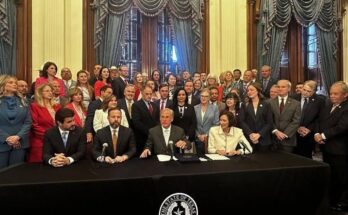The official report called it an accident. A cruel twist of fate. But Erika Kirk knew better. She knew about the “plan”—the cold, deliberate, and cruel plot to silence her husband, Charlie. Now, the quiet widow is done playing by their rules. Her grief has turned to pure fury, and her confession at his graveside changes everything. What did she reveal that has the powerful running scared? Who are “they”? We have the details of her earth-shattering statement.

The air at Crestview Memorial Park was cold, hanging heavy with the scent of damp earth and lilies just beginning to turn. It was a stillness broken only by the distant hum of the city and the shuddering breaths of a woman standing before a new, polished granite headstone. For weeks, Erika Kirk had been a phantom, a veiled figure of public grief, moving through the motions of a life she no longer recognized. But on this night, under a sky the color of a fresh bruise, the silence that had encased her finally cracked.
Tears, hot and furious, streaked the dust on her cheeks. She knelt, her fingers tracing the cold, carved letters of her husband’s name: CHARLES “CHARLIE” KIRK.
“They did this to you,” she whispered, the words stolen by the wind. She said it again, louder, the sound tearing from her throat, raw and full of jagged edges. “They did this to you… and I stayed silent too long.”
It was a confession. Not of guilt, but of a terrible, suffocating knowledge. Her voice, trembling at first, began to rise, gaining a horrifying strength fed by weeks of suppressed fury, profound grief, and a truth that refused to be buried any longer.
What she said next—what she finally said—was a seismic charge planted at the foundation of the official story. It was a declaration that would, in the coming days, shake the public’s trust and ignite a firestorm.
“It wasn’t an accident,” she cried out to the ghost of the man she loved. “It was a plan. Cruel. Deliberate. And I know who they are.”
The woman who had once vowed to protect Charlie’s memory, who had stood stoic and silent at his funeral as the world mourned a “tragic accident,” was gone. In her place stood an avenger, her profound love transformed into an iron-willed defiance. And as her accusation echoed through the still air of the cemetery, it was as if the grave itself answered—no longer silent, no longer still—but alive with the sound of a truth finally, violently, breaking free.
This is the story of that truth. It is the story of the man they silenced, the woman who refused to stay broken, and the conspiracy that is only now beginning to unravel.
The Man Who Knew Too Much
To understand the weight of Erika’s words, you must first understand the man Charlie Kirk was. To the public, he was the Pulitzer-nominated investigative journalist for The Sentinel. His byline was a promise of unflinching integrity, a guarantee that no stone, no matter how heavy or how high up the mountain, would be left unturned. He wasn’t just a reporter; he was a storyteller who wielded facts like a surgeon’s scalpel, cutting away the rot to expose the sickness beneath.
He was 42, with a laugh that came easily and eyes that missed nothing. He had spent the last two decades building a reputation for tackling the stories no one else would touch: shadow banking, political corruption, arms dealing, and the exploitation of public trusts. He was, in the words of his long-time editor, “a righteous pain in the neck,” the kind of man who collected more powerful enemies than he did awards—and he collected plenty of awards.
His life with Erika was his anchor. They had met on assignment ten years prior—he the relentless journalist, she the sharp legal aid lawyer fighting for housing rights. Theirs was a partnership built on mutual respect and a shared, quiet fury at injustice. They were a team. While Charlie chased the story, Erika provided the ethical and legal framework, often a step ahead of the high-priced lawyers his subjects employed.
For the last six months of his life, Charlie had been consumed. He was distant, working late into the night in his home office, the door locked, the hum of his encrypted hard drives a constant soundtrack in their quiet home.
“It’s the big one, E,” he had told her just a week before his death, his face pale with exhaustion but his eyes burning with a familiar fire. “This one… this one changes everything.”
Erika, respecting his process, hadn’t pressed for details. She knew he was investigating “Apex Strategic,” a nebulous private intelligence firm with deep, almost invisible ties to government defense contracts. He had mentioned “off-book operations” and “data funnels” that made no sense. She had warned him to be careful. The people he was looking at weren’t just white-collar criminals; they were ghosts who operated in the dark.
“Careful is my middle name,” he had joked, kissing her forehead.
It was the last time she would see him alive.
The “Accident” on Route 119
The official story was clean, tragic, and devastatingly simple.
On the night of September 28th, Charlie Kirk was driving back from a supposed meeting with a source in the upstate mountains. A sudden, violent storm had swept through the region. The police report cited “excessive speed for the conditions” and “loss of vehicle control” on the winding, treacherous stretch of Route 119.
His car, a late-model sedan known for its safety features, had plunged through a guardrail and into the rocky ravine below. He was pronounced d@ad at the scene. First responders noted the severity of the crash, and the coroner’s report was swift: accidental d@ath due to blunt force trauma.
The case was closed within 48 hours.
The media narrative followed suit. It was a story of a brilliant light extinguished too soon. A terrible accident. A tragedy. His colleagues at The Sentinel published heartfelt tributes. The powerful figures he had so often investigated released polite, sterile statements of condolence. The world mourned the loss of a great journalist, a victim of bad weather and a bad road.
Erika was hollowed out. The grief was a physical weight, a crushing pressure in her chest that made breathing a conscious, painful effort. She moved through the funeral in a fog, accepting condolences, her face hidden behind a black veil. The world saw a widow broken by a random act of fate.
But even then, in the deepest recesses of her shock, a tiny, cold splinter of doubt had begun to form. Charlie was a meticulous driver. He knew that road. And “excessive speed”? It wasn’t his style. He was the man who checked his tire pressure before a long drive, the man who believed “careful” was, indeed, his middle name.
Something was wrong.
The Weight of Silence
In the weeks that followed, Erika’s home became a mausoleum. Charlie’s study remained locked, exactly as he had left it. She couldn’t bring herself to enter, to touch his things, to accept the finality of it all.
Then, the subtle reminders began.
A black sedan, idling across the street for hours at a time. A “click” on her phone line that was too sharp to be static. And then, the card.
It arrived in a plain white envelope with no return address, tucked into her overstuffed mailbox. It was a simple, elegant condolence card. Inside, a pre-printed message of sympathy. Below it, a handwritten note in neat, block capitals:
“A TRAGIC LOSS. HE WAS CARELESS. DON’T MAKE THE SAME MISTAKE.”
The blood drained from her face. It wasn’t a warning; it was a confirmation. This was the “they” she now spoke of. Her silence, which had begun as grief, now curdled into a cold, paralyzing fear. They were watching her. They knew she might have doubts. The message was clear: stay the grieving widow. Be silent. Or join him.
For two weeks, she obeyed. She stopped talking to Charlie’s colleagues. She disconnected her internet. She lived as a ghost in her own home, the weight of her unspoken knowledge a physical sickness. She was trapped between the love for her husband, which demanded she scream the truth, and the terror of the people who had silenced him, who were now implicitly threatening to silence her, too.
She understood, with chilling clarity, that she was the only person alive who might even suspect this wasn’t an accident. And “they” knew it.
The Key and the Lock
The change—the transformation from victim to avenger—did not happen all at once. It began with a memory.
Erika was staring at the coffeemaker, his favorite mug still hanging on its hook, a relic of a life that felt like it belonged to someone else. She remembered a conversation from months ago, a joke he’d made.
“If I ever disappear,” he’d said, stirring his coffee, “check the bookshelf. Shakespeare. The Tempest.”
“What are you, a spy in a cheap novel?” she had replied, rolling her eyes.
He had just grinned. “Just remember. The Tempest.”
Her heart hammered against her ribs. She moved, as if in a trance, to his study. The room still smelled of him—old books, coffee, and a faint trace of his aftershave. Her hand trembled as she unlocked the door.
The bookshelf was floor-to-ceiling. She found the collected works of Shakespeare. Tugging on the spine of The Tempest, she felt a slight click. It wasn’t the book; it was the shelf itself. A small, disguised panel popped open, revealing a hidden compartment no bigger than a shoebox.
Inside was a single item: a military-grade, encrypted USB drive.
It was the key. Her fear was still present, a cold stone in her stomach, but a new emotion now joined it: rage. Hot, white, and pure.
She took the drive to a new laptop, one she had purchased with cash at a big-box store miles from her home. She booted it up using a secure, anonymous operating system. When she plugged in the drive, a single password prompt appeared.
She tried “Tempest.” Access denied. She tried “Apex.” Access denied. She tried their anniversary, their pet’s name, his mother’s maiden name. All denied.
She sat back, frustrated, staring at the screen. What was the one thing he would trust, the one thing only she would know? She thought back to that final conversation. “It’s the big one, E. This one changes everything.”
She typed in the password: CHANGESEVERYTHING.
Access granted.
The Plan Unveiled
For the next 72 hours, Erika Kirk did not sleep. She read, her horror and fury growing with every file she opened.
Charlie hadn’t just been investigating Apex Strategic. He had uncovered a vast, criminal conspiracy that dwarfed anything he had ever touched. He had dubbed it “Project Chimera.”
It was a plan, just as she’d whispered at his grave. A cruel, deliberate plan.
Apex, in collusion with powerful, unnamed figures in government, was orchestrating a series of destabilizing cyber-attacks on foreign infrastructure. Their goal: to simulate a credible threat from a specific, oil-rich nation, thereby creating the political will for military intervention. Apex and its shadow partners stood to gain billions in defense and “reconstruction” contracts.
It wasn’t just corporate malfeasance. It was treason. It was manufactured war for profit.
Charlie had it all. Encrypted emails. Coded wire transfers. A recorded phone call with a high-level Apex executive explicitly discussing the “plausible deniability” of their operations. And, most damning of all, a manifest of “assets” on the ground—mercenaries and hackers—tasked with creating the chaos.
His “source,” she realized, must have been a whistleblower from within Apex, someone who had gotten cold feet. The meeting on Route 119 was likely the handover of the final piece of evidence.
And “they” had been waiting for him.
She found the last file on the drive, one Charlie must have added just hours before he left. It was a full report on his own car. He had suspected he was being followed. He had taken it to a private mechanic, who found a tiny, sophisticated device attached to the brake line—a remote-access mechanism capable of causing catastrophic failure on command.
He knew they were coming for him. He just hadn’t known it would be so soon.
The police report flashed in her mind. Loss of vehicle control. It wasn’t an accident. It was a remote-controlled execution.
The grief that had hollowed her out now ignited. It was no longer a passive sorrow; it was fuel. The love she felt for her husband—a love that had been muted by fear—crystalized into a singular, sharp purpose.
They had not just killed Charlie. They had tried to kill his truth. They had tried to make his life’s work mean nothing. They had underestimated the one person he had trusted with everything.
Her silence was over.
The Confession and the Avenger
This new knowledge brought her to Crestview Memorial Park. This was not a spontaneous breakdown, as it might have appeared. It was a calculated act. It was a promise.
She stood before his grave, the USB drive warm in her pocket, a copy of its contents already in the hands of a trusted international journalism consortium, set to release on a dead man’s switch if she, too, met with an “accident.”
Her whisper, “They did this to you,” was for him.
Her cry, “It was a plan,” was for the world.
She had made one phone call before driving to the cemetery, to a contact she knew would understand, the only reporter at The Sentinel Charlie had said he would “trust with his life.” The reporter was waiting, hidden in the trees, a long-lens camera capturing Erika’s defiance, a digital recorder capturing every explosive word.
Erika Kirk walked out of the cemetery that night as a different person. The veiled widow was gone. In her place was a woman on a mission, a woman who had seen the absolute worst of human greed and had decided to fight back.
Her confession was the first shot. The war for Charlie’s truth had just begun. The nation was about to be shaken to its core, and the powerful men who operated in the shadows were about to learn the true meaning of the word “avenger.”
The truth, like the man who died for it, refused to be buried any longer. It was, at last, breaking free.



